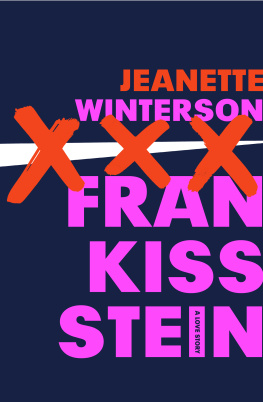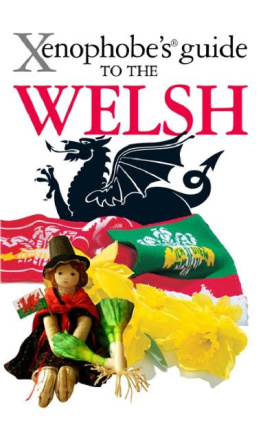ALSO BY JEANETTE WINTERSON
Novels
Oranges Are Not the Only Fruit
The Passion
Sexing the Cherry
Written on the Body
Art & Lies
Gut Symmetries
The Powerbook
Lighthousekeeping
The Stone Gods
The Gap of Time
Frankissstein
Comic Books
Boating for Beginners
Short Stories
The World and Other Places
Midsummer Nights (ed.)
Christmas Days: 12 Stories and 12 Feasts for 12 Days
Novellas
Weight (Myth)
The Daylight Gate (Horror)
Non-fiction
Art Objects: Essays in Ecstasy and Effrontery
Why Be Happy When You Could Be Normal?
Courage Calls to Courage Everywhere
Collaborations
LAND (with Antony Gormley and Clare Richardson)
Childrens Books
Tanglewreck
The Lion, the Unicorn and Me
The King of Capri
The Battle of the Sun
Footnote
Postscript (2022): I Can, Therefore I Am
Guardian, 30 November 2021.
Postscript (2022): I Can, Therefore I Am
The Metaverse
In the metaverse youll be able to do almost everything you can imagine.
Mark Zuckerberg
When I first published 12 Bytes in 2021, Facebook hadnt rebranded as Meta. That happened later in the year, along with Mark Zuckerbergs happy-clappy promise of a utopian virtual world the metaverse owned by the company formerly known as Facebook.
Meta will still operate under its Facebook, WhatsApp, and Instagram brands, reaching more than 3 billion users around the world.
Meta is much more to Facebook than corporate logistics. For instance, Google renamed its parent company Alphabet in 2015, but for Zuckerberg, the makeover is many things including a not-so-subtle way of trying to ditch the negativity that clings to the Facebook image; we use it but do we like it? Not so much.
Facebook had a split-personality problem from the start: Are we a platform? Are we a publisher? Are we responsible for content or are we not? These questions havent found effective reconciliation via its much-hyped, independent, oversight board. Facebook is regularly criticised for not doing enough to combat hate speech, privacy invasion and conspiracy theories, while doing too much behavioural nudging to get us to spend more time on the platform, part with personal data and buy stuff advertised on its site.
After whistleblower Frances Haugen released what became known as the Facebook Papers (2021), some of the damage caused by the social media giant seemed to look less like unforeseen consequences for a young company that couldnt know its own strength, and more like either deliberate carelessness intended to protect profits, or structured policy decisions with an eye on the bottom line.
Facebook number two, Sheryl Sandberg, who left the company in 2022, was the powerhouse-mind behind driving the advertising revenue, but overall strategy points to Zuckerberg himself. If the Facebook Papers tell an accurate story, Zuckerbergs mild and contrite public statements, regularly asking us to remember that Facebook is an organisation still learning, managing outcomes impossible to forecast, seem to be at odds with his in-house, shareholder obsession with global reach, money and power.
Meta as a rebrand can look like a new departure, a line under the past, especially as Sandberg wont be part of it.
The word itself deriving from the Greek, and meaning beyond or after in the sense of what comes after, when a thing is transformed, or carried over (think metaphor, metabolism, metamorphosis) is typical of the Zuckerberg hubris. (Another good Greek word for overweening pride and it usually leads to nemesis.)
Whatever Zuckerbergs romp among the classics turns out to be, Meta is, above all, a meta-opportunity to build new markets. And new markets are what Zuckerberg badly needs.
Facebook is less popular among younger users than it wants to be. Popular may be too kind a word irrelevant may be more accurate, as TikTok is swallowing migrating shoals of users and influencers. How to get back the market share? A new product!
As usual with Facebook, the new product isnt called a product at all its an open community where everyone can buy virtual real estate, set up their business, and build their own avatar (purchasing lots of expensive accessories). Heres an opportunity to be part of the non-stop party in beautiful, virtual spaces, built by Meta. Even going to work will be fun.
In the metaverse, youll be able to do almost anything you can imagine get together with friends and family, work, learn, play, shop, create as well as completely new experiences that dont really fit how we think about computers or phones today.
Mark Zuckerberg, Founders Letter, 2021
No mention here of mining data, personalised advertising, or creating products based around Metas Oculus VR system, now known as Quest 2. No mention either of Zuckerberg telling investors that he expects to lose significant quantities of cash pursuing his next connectivity dream.
If it works, perhaps the gamble will pay off for Meta. But there are plenty of other companies, and start-ups, who too want to build metaverses.
So, what is the metaverse?
The metaverse is enabled, immersive, 3D internet, at present only available to us when we wear chunky goggles that make a lot of people feel seasick after an hour or so.
At present, the metaverse isnt much more than a video game, like World of Warcraft, Fortnite or Minecraft, experienced in 3D instead of 2D.
That will change.
The metaverse isnt like a Zoom call that stops when everyone goes away. It is a persistent reality. Like the real world we live in. You can close your eyes, but America is still there. And its there whether you believe in it or not, participate or not. Will the metaverse be a rival world?
It might be.
Certainly, users will be able to build their own homes and businesses in the metaverse, but there will be public spaces too: concert venues, theatres, dance halls, virtual benches in virtual parks where virtual selves can sit down with their virtual dogs.
And shops. Plenty of shops. As so much of retail is already online, an enhanced experience where your body-double avatar can try on the clothes before you buy them will save fashionistas a lot of trouble. A cute idea is to buy an outfit for your avatar, and one for you in the real world too. Two for the price of two. I am sure there will be special offers.
In the world where we live, when a developer pays for an entertainment venue, they want to get a return on their money. In the metaverse, big companies who build virtual architecture in virtual spaces will also want a return. Meta is spending billions on its metaverse. There will need to be a hefty payback.
Inevitably, so much of what is envisioned spirals around retail and services. This isnt a version of Thoreaus Walden simple living in natural surroundings with a small carbon footprint. Its more bling than being.
But there will be genuine low-carbon life-enhancing opportunities.
Meeting others in the metaverse, wherever those others are physically located, is the logical innovation after the phone call and the Zoom call.
If I am in Manchester, UK, and my friend A. M. Homes is in New York City, we can arrange to meet at a location in the metaverse and send our avatars to sit on a beach in virtual Miami or go to an exhibition happening in real time in a virtual Bilbao.









